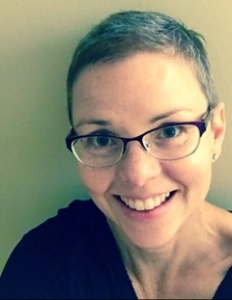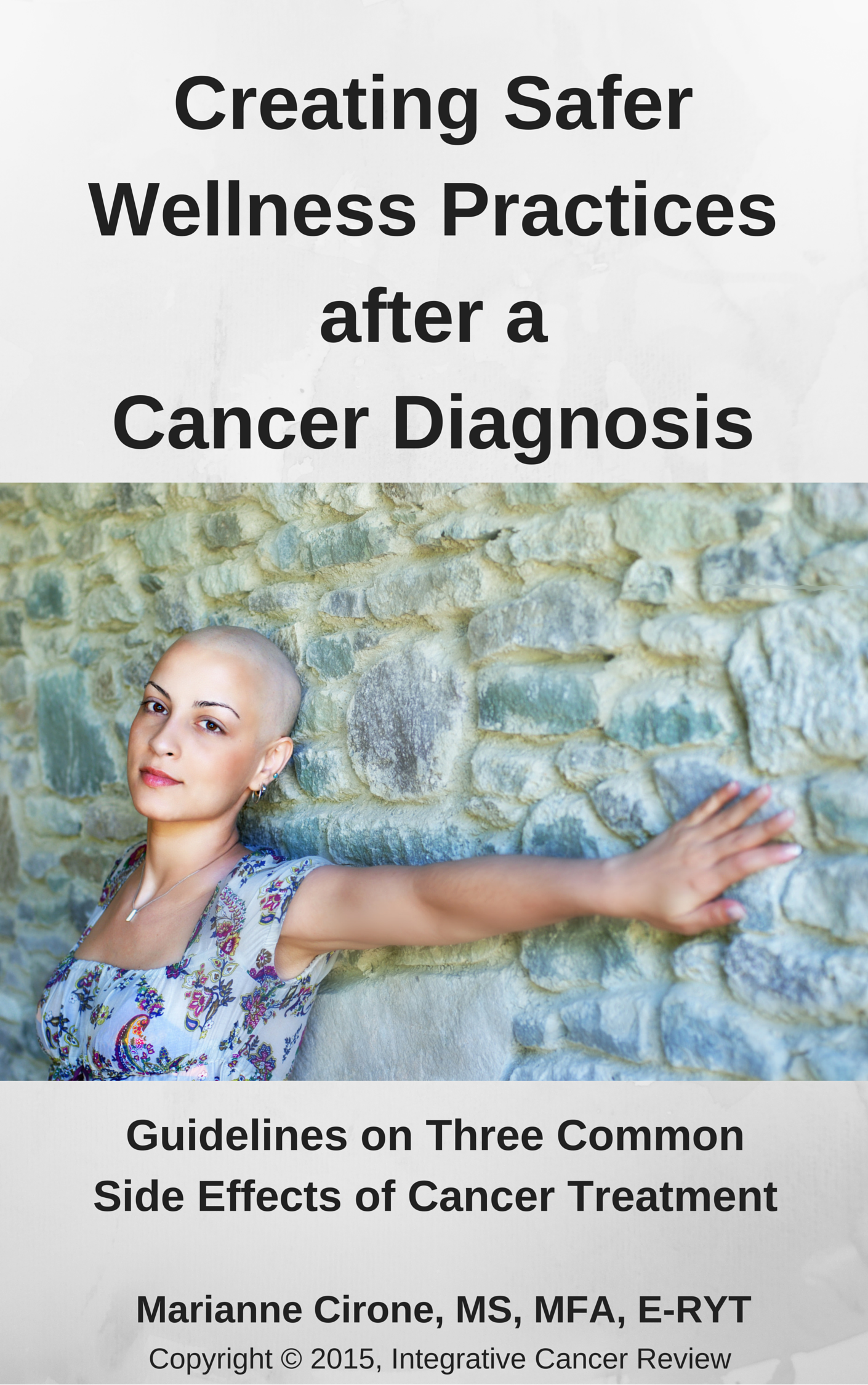
April of this year will mark thirteen years since my breast cancer diagnosis at age 34. While I have always felt grateful to have survived cancer, I have also wrestled with depression.
Unfortunately, I am not alone.
Depression occurs in cancer patients at a rate three to five times higher than that of the general population.[1]
 Jodi MacLeod is a writer, patient advocate and twelve-year breast cancer survivor living in the Greater Philadelphia area. She maintains a wellness blog called WRITE4WELLNESS, focusing on clinical research in cancer wellness and integrative oncology.
Jodi MacLeod is a writer, patient advocate and twelve-year breast cancer survivor living in the Greater Philadelphia area. She maintains a wellness blog called WRITE4WELLNESS, focusing on clinical research in cancer wellness and integrative oncology.
Jodi is also a writer, blogger and patient co-investigator for the CHOICE Study (Choosing Options for Insomnia in Cancer Effectively), a two-site research trial comparing acupuncture and cognitive behavioral therapy for insomnia in cancer survivors being conducted by leaders in integrative medicine research.
Risk Factors for Depression after Cancer
At the recent annual conference of the Society for Integrative Oncology (SIO) in Miami, FL, Dr. Michael Irwin, a psychoneuroimmunologist at UCLA, presented research on depression, sleep, and immune function in cancer patients. Dr. Irwin could have been reading from my medical records, as I had many risk factors for developing a major depressive episode within two years of completing cancer treatment: I am female, have previous experience with depression, chemotherapy was part of my treatment, and I had the insomnia, pain and fatigue that often accompany depression.
By definition, depression is a prolonged period of “lack of interest and pleasure in daily activities, significant weight loss or gain, insomnia or excessive sleeping, lack of energy, inability to concentrate, feelings of worthlessness or excessive guilt and recurrent thoughts of death or suicide”.[2] Depression wears many faces, from irritability to apathy to sadness.
Identifying Depression after Cancer Treatment
When depression occurs after cancer treatment is completed, it coincides with the natural diminishing of active support from family and friends. Everyone returns to the routines of their daily lives, and expectations are that the cancer survivor will do the same.
The depression that overtook me after cancer treatment was the worst I had ever experienced. As a young wife and mother of three small children, I found myself unable to function. In retrospect, I waited too long before seeking help; I delayed until I no longer cared if help came.
By then, I needed hospitalization for depression, which changed my life and set me on the tough road of recovery. Had any of my doctors screened me for mood disturbance or asked about my stress level, they may have uncovered my urgent need for more support. Had I valued self-care then as I do now, I may have been able to slow my unsustainably hectic pace of life.
Distress Screening Guidelines and Resources
Fortunately, as of 2015, the American College of Surgeons’ Commission on Cancer requires cancer programs to establish a method to screen all newly diagnosed patients for their level of distress, and based on results, offer appropriate levels of psychosocial care. According to the American Psychosocial Oncology Society (APOS), these new accreditation standards “have placed a heavy burden on some cancer centers, who are actively seeking ways to overcome challenges and barriers with implementing comprehensive distress screening programs.”
If you find yourself in a similar situation, help is reachable. If you have a psychiatrist or therapist, make an appointment for this week, if possible. If you do not currently see these providers, the first step is to find a clinician who can evaluate you. The APOS website provides a toll-free, confidential Helpline to help people with cancer and their caregivers find emotional support in their own communities.
According to the APOS website, this referral program, part of the Cancer Support Helpline® (affiliated with the Cancer Support Community), connects cancer patients, their caregivers and advocacy organizations with thousands psychiatrists, psychologists, nurses, social workers, and counselors skilled in the management of cancer-related distress.
To request a confidential referral, please call:
Toll Free 1-866-276-7443 (1-866-APOS-4-HELP).
Calls are accepted Mon-Fri 9 am- 8 pm ET.
If you reach a recording, please leave your name and contact number, and one of the Helpline counselors will call you as soon as possible.
Your insurance network website or customer service line will also have a list of psychiatric care providers near you. Psychology Today has a helpful website to identify providers in your area. Seeking help is both scary and courageous. Depression can make every task seem more difficult, but you will never regret seeking help.
Depression Symptoms and Self-Care Strategies
Since my recovery from post-treatment depression, I have been able to spot early signs of relapse and tweak my self-care practices until I am again functioning well. Through cognitive behavioral therapy (CBT), I learned the precursors of relapse. Among my red flags are increased irritability, apathy, and what I call a “frantic mind.”
CBT also helped me discover activities that lift my mood both short and long term. In my long term toolbox are regular aerobic exercise and yoga. I love the positive energy of Zumba classes, and yoga reminds me how strong I really am. My other hobbies, always good pick-me-ups, are painting, sketching, playing the piano and working on jigsaw puzzles. These are solitary activities, which work well for my introverted personality. Depression never occurs in a vacuum, though, and a healthy social give and take can be life-affirming. In the afternoons, I enjoy talking with my husband and son, cooking dinner for the three of us, laughing about our days. Also, our family beagle is a little therapist in her own right, consistently dispensing tail wags and kisses.
Evidence-based Integrative Therapies for Depression
One new, helpful tool I learned about at the SIO Conference is mindfulness. Research presented by Dr. Irwin and others reveals mindfulness therapies such as yoga, tai chi, qigong, mindfulness-based stress reduction (MBSR), and meditation to be effective in improving mood, sleep quality, and biomarkers of inflammation, immune function and longevity.[3-5] Stress, whether we increase or decrease it, affects us on a cellular level. Mindfulness therapies– practiced consistently– offer incredible, holistic benefits.
Mindfulness-based Stress Reduction Training
After the conference, I enrolled in an online MBSR course by the University of Massachusetts Center for Mindfulness.[6] Based on the work of Jon Kabat-Zinn PhD, professor at University of Massachusetts, and his book, Full Catastrophe Living, MBSR blends Buddhist meditative traditions with modern science and psychology. For the past 35 years, the Center for Mindfulness has been at the forefront of MBSR training, instructor training and research. The online course is delivered through Sounds True, which has a smartphone application for convenience.
This Mindfulness course consists of eight sessions, each comprised of videos segments featuring instructors Saki Santorelli, EdD, MA, and Florence Meleo-Meyer, MS, MA, and details for each week’s home practice. The teachers provide instruction in sitting meditation, as well as the body scan and both standing and lying down yoga. Students are encouraged to explore new ways of responding to stressful situations and emotions, and to examine current patterns of communicating within relationships. Once the course is completed, students can always go back and retake the course, use the guided meditations, or reference the drawings of yoga sequences.
Incorporating Mindfulness into Daily Life
I am still new to mindfulness practice and in the early mornings, before anyone else is awake, I practice sitting meditation for twenty minutes, and yoga for another twenty. Some days, I’ll access the guided body scans from the Sounds True application on my smartphone. Though the goal will be eventually to meditate without the aid of the instructors’ guiding voices, I am not quite there yet.
Frequently, after a practice, I journal about thoughts and emotions that arose during meditation. Slowly, I am learning how to step out of old, ruminating thought pathways and cultivate awareness of moments as they occur. So often, I can be “in my head” and go through the day on autopilot. Mindfulness practice interrupts that and offers new ways of accepting each thought and feeling, noting its passing nature, and remaining in touch with what is “now.”
Through meditation and practicing body scans and yoga, I am learning to both listen to and trust my body. As it turns out, my body has a great deal to say to me; it holds the keys to both the past and present. When moments of stress arise, I can use awareness of the breath as an anchor to the present moment. Often, practice is not easy, and I find myself brooding rather than simply being aware of the breath or of sound. Yet the fact that I become aware of this in in itself mindful discovery.
For those who suffer depression after cancer, there are many reasons to hope. In addition to medications and talk therapy, research supports the use mindfulness practices, as well as integrative music and art therapies. Just as we experienced cancer and its treatment as whole mind-and-body persons, we can engage holistically in survivorship self-care.
I encourage readers to explore various mindfulness therapies, and notice the new awareness they bring. It is my hope that through these interventions and practices, research will one day find that depression after cancer is no longer such a common experience.
References:
- Irwin MR. Depression and insomnia in cancer: prevalence, risk factors, and effects on cancer outcomes. Curr Psychiatry Rep. 2013 Nov:15(11):404. Available from URL https://www.ncbi.nlm.nih.gov/pubmed/24078066. Accessed 1-13-2017
- Depression, adapted from Encyclopedia of Psychology. American Psychological Association website. Available from URL http://www.apa.org/topics/depression/. Accessed 1-14-2017
- Stagi, et al. A randomized controlled trial of cognitive-behavioral stress management in breast cancer: survival and recurrence at 11-year follow-up. Breast Cancer Res Treat. 2015 Nov: 154(2):319-28. Available from URL https://www.ncbi.nlm.nih.gov/pubmed/26518021. Accessed 1-13-2017
- Carlson LE. Mindfulness-based interventions for coping with cancer. Ann N Y Acad Sci. 2016 Jun: 1373(1):5-12. Available from URL https://www.ncbi.nlm.nih.gov/pubmed/26963792. Accessed 1-13-2017
- Irwin, et al. Tai chi, cellular inflammation, and transcriptome dynamics in breast cancer survivors with insomnia: a randomized controlled trial. J Natl Cancer Inst Monogr. 2014 Nov 2014(50):295-301. Available from URL https://www.ncbi.nlm.nih.gov/pubmed/25749595.
- MBSR Online Course via Sounds True Application. Center for Mindfulness, University of Massachusetts Medical School. Available from URL http://www.umassmed.edu/cfm/stress-reduction/mbsr-online/. Accessed 1-16-2017















